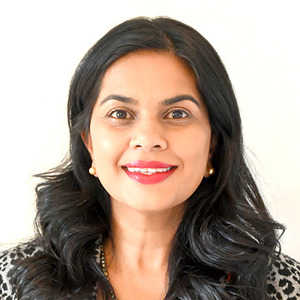
Mariya Moosajee
Power List Profile
Professor of Molecular Ophthalmology and Consultant Ophthalmologist, Moorfields Eye Hospital, UCL Institute of Ophthalmology and The Francis Crick Institute, London, UK
What is an interesting or little-known fact about you?
I like to think I am a hyper-realist oil painter. When I was a medical student and junior doctor, I was commissioned to paint several large pieces of art for public display!
Why did you decide to pursue ophthalmology/your subspecialty?
I watched a television campaign on river blindness in 1986 and almost immediately decided that I wanted to become a doctor and help people preserve their sight. It was many years later – in 2000 – that I first learnt about the Human Genome Project and the role of genes in eye development and disease, and so began my interest in ophthalmic genetics.
Who is someone in ophthalmology/your subspecialty that you feel has been particularly influential over the past 10 years?
Prof Jean Bennett, Professor of Ophthalmology at the University of Pennsylvania, Philadelphia, USA. Her laboratory developed the first approved retinal gene therapy, Luxturna (voretigene neparvovec), for use in our RPE65 patients across the world. This was a major advance for medicine overall.
What’s been the biggest breakthrough in ophthalmology/your specific field over the last 10 years?
Over the past 10 years, advances in genomic medicine have heralded the introduction of whole genome sequencing on our National Health Service (NHS) for suitable genetic eye disease patients as part of their standard of care. This has led to more than doubling in the molecular diagnostic rates for those with a wide range of anterior and posterior segment disorders, and correspondingly a better understanding of the role of ocular genes in health and disease. The benefits for the patient and their family are significant. Firstly, it helps them find out the cause of their condition, supports informed genetic counseling, including inheritance risk and family planning advice, and importantly provides access to potential treatments, clinical trials, and/or pertinent research. If we do not offer expert genetic input for all eligible disease groups, such as those with ocular maldevelopment (including microphthalmia, anophthalmia, ocular coloboma, anterior segment dysgenesis and congenital glaucoma), then our chance of discovery and advancement in this field will be stifled, ultimately to the patient’s detriment.
Where do you predict ophthalmology/your subspecialty will be 10 years from now?
I would like to see equity of care for patients from across the world that need expertise in genetic eye disease. I hope that the costs of genetic testing are reduced, so more patients can access investigations like whole genome sequencing (WGS), and that health care professionals pay close attention to increasing the ethnic diversity of our datasets to improve our diagnostic rates. In the UK, I would predict every patient will have WGS undertaken either at birth or at the point of clinical care, to guide their medical management throughout their lifetime. I also hope there will be a number of treatments available that are gene/mutation-specific but also more agnostic so we can offer hope and the chance to prevent progressive sight loss.
